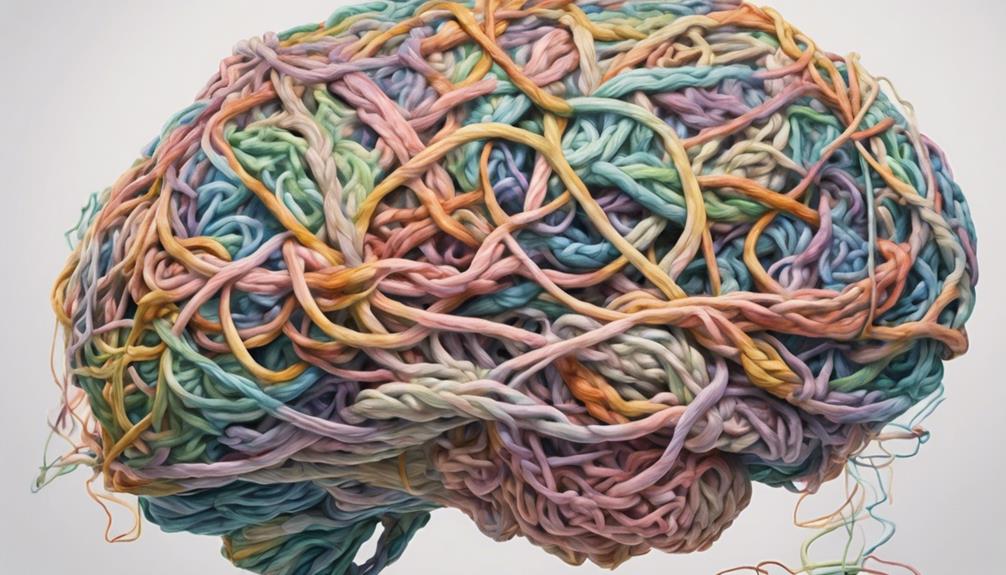In exploring the intricate interplay with narcissistic individuals, we uncover methods to incite a sense of longing and remorse within their hearts.
By peeling back the layers of their behavior and motivations, we reveal nuanced strategies that can sway their sentiments and actions.
As we navigate this delicate dance, we invite you to discover the subtle yet potent ways to make a narcissist yearn for your presence and ponder the path not taken.
Key Takeaways
- Understand what the narcissist valued in you for strategic advantage.
- Use past ego triggers to maintain control over their emotions.
- Create scarcity by making yourself less available to increase their desire.
- Control the supply of attention and admiration to make them miss your presence.
Understanding Narcissistic Behavior
Understanding the behavior of narcissists sheds light on their self-centered nature and emotional complexities. Narcissists are individuals who prioritize their own emotions and needs above all else. They often seek out relationships that provide them with a source of admiration and validation, rather than genuine connection and intimacy.
When interacting with a narcissist, it's important to recognize that they may not miss the person but rather the positive emotions and ego boosts that person provided. It's crucial to understand that narcissists can easily replace individuals who fulfill similar roles in their lives, as they value the function someone serves rather than the individual themselves.
Key Strategies for Making Them Miss You

To make a narcissist miss you and regret, strategically implementing key tactics can influence their perception and emotions towards you.
- Understand Their Triggers: Identify what the narcissist valued in you to leverage those aspects effectively.
- Maintain Control: Use past ego triggers to keep them engaged while making yourself less available to increase their desire for your attention.
- Control the Narrative: Manage the supply of attention and admiration to create a sense of longing in the narcissist.
- Break Down Barriers: Encourage emotional intimacy to challenge their defenses and foster a deeper connection that they'll miss.
Strategic Ways to End the Relationship
Implement strategic methods to gracefully conclude a relationship with a narcissist, navigating challenges with tact and foresight. When ending a relationship with a narcissist, it's crucial to handle the situation delicately to minimize potential backlash or manipulation. Here are some strategic ways to end the relationship:
| Strategic Ways to End the Relationship |
|---|
| Avoid arguments and criticisms |
| Use negative behavior as a reason for the breakup |
| Challenge their perception of your worth |
| Let them believe they are ending the relationship |
| Avoid emotional responses to manipulation attempts |
Focusing on Personal Growth and Appearance

In focusing on personal growth and appearance, one must prioritize inner development alongside external presentation to signal confidence and attract the desired attention.
- Invest in Self-Improvement: Engage in activities that enhance personal growth and well-being.
- Embrace Confidence: Display self-assurance through your posture, speech, and actions.
- Reflect Your True Self: Let your external appearance mirror the person you aspire to be.
- Cultivate Intrigue: Draw attention by showcasing a multifaceted personality and diverse interests.
Engaging Techniques for Dealing With Narcissists
Engaging with narcissists requires strategic communication and behavior that navigate their tendencies for self-focus and manipulation. When dealing with individuals who prioritize their own needs, it's essential to approach interactions thoughtfully. Here are some techniques to effectively engage with narcissists:
| Engaging Techniques | Description |
|---|---|
| Ask Ego-Boosting Questions | Get them to talk about themselves. |
| Withhold Praise | Keep them talking about themselves without praise. |
| Spark Their Interest | Make yourself seem unattainable to pique curiosity. |
| Challenge Known Flaws | Engage them by addressing their weaknesses. |
| Seek Approval Wisely | Avoid showing too much admiration to maintain control. |
Unveiling Their True Needs and Desires

Navigating the intricate dynamics of engaging with narcissists involves uncovering their true needs and desires to effectively communicate and influence their behavior.
- Validation: Narcissists crave validation and admiration to boost their self-esteem.
- Control: They seek to control situations and people to maintain their superior image.
- Attention: Constant need for attention and admiration to fuel their ego.
- Insecurity: Underneath the facade of confidence lies deep-rooted insecurity driving their behavior.
Understanding these core needs can help tailor interactions with narcissists to elicit desired responses. By acknowledging and addressing these needs strategically, one can navigate interactions with greater empathy and effectiveness, potentially influencing their behavior positively.
Leveraging Emotional Intimacy and Vulnerability

Understanding the emotional needs and vulnerabilities of narcissists is crucial in effectively influencing their behavior and fostering genuine connections. When dealing with a narcissist, leveraging emotional intimacy and vulnerability can be a powerful tool. By creating a sense of emotional closeness, you can break down their walls and establish a deeper connection. This can lead to them valuing you on a more personal level, rather than just as a supplier of their needs. To illustrate the importance of emotional intimacy and vulnerability, consider the following table:
| Emotional Intimacy | Vulnerability |
|---|---|
| Builds trust | Allows for growth |
| Fosters connection | Shows authenticity |
| Strengthens bond | Encourages empathy |
Crafting a New Narrative of Self-Worth

Crafting a new narrative of self-worth involves redefining one's value beyond external validation and embracing intrinsic qualities that foster genuine confidence and fulfillment.
- Discover Your Unique Strengths: Identify and celebrate your individual qualities that make you valuable.
- Practice Self-Compassion: Treat yourself with kindness and understanding, recognizing your worth regardless of external opinions.
- Set Boundaries: Establish clear boundaries that protect your self-esteem and prevent others from undermining your sense of self.
- Cultivate Authentic Connections: Surround yourself with supportive individuals who appreciate you for who you are, reinforcing your self-worth through genuine relationships.
The Power of Indifference and Confidence

The demeanor of indifference and confidence can wield significant influence in navigating relationships with narcissists.
When interacting with a narcissist, exuding a sense of self-assuredness and detachment can disrupt their usual power dynamics. By maintaining a calm and collected attitude, you're signaling that their attempts to manipulate or control you're ineffective. This can lead the narcissist to question their hold over you and potentially crave the attention they're no longer receiving.
Additionally, displaying confidence can make you appear more attractive and desirable, causing the narcissist to regret losing your validation. Remember, staying composed and self-assured in the face of a narcissist's tactics can shift the balance of power in your favor and make them miss your presence.
Frequently Asked Questions
Can a Narcissist Ever Truly Change and Regret Losing Someone?
Yes, a narcissist can potentially change and regret losing someone. However, this transformation is rare and challenging due to their deep-seated behaviors and beliefs. It requires extensive self-reflection, therapy, and a genuine desire to change.
While possible, it often takes significant time and effort. Understanding the complexities of narcissistic personality traits is crucial in assessing the potential for true change and regret in these individuals.
How Do Narcissists Typically React to Being Ignored or Made to Feel Unimportant?
When ignored or made to feel unimportant, narcissists often react with frustration or anger. They may seek attention or validation from other sources to compensate for the perceived slight. Their ego-driven nature makes it challenging for them to handle situations where they aren't the center of attention.
Understanding this behavior can help us navigate interactions with narcissists and set boundaries to protect our well-being.
Is It Possible for a Narcissist to Feel Genuine Emotional Intimacy With Someone?
It's challenging for narcissists to experience genuine emotional intimacy due to their focus on self and difficulty with vulnerability. They prioritize their own needs and validation over deep connections with others. While they may simulate intimacy for personal gain, it often lacks authenticity.
Understanding these traits can help navigate relationships with narcissists and set realistic expectations for emotional closeness. Building awareness of their limitations can lead to healthier interactions and self-care practices.
What Are Some Red Flags That Indicate a Narcissist Is Losing Interest in a Person?
When a narcissist is losing interest, signs like decreased communication, lack of engagement, and seeking attention elsewhere may surface. These behaviors can indicate a shift in focus away from the person.
Understanding these red flags is crucial in navigating relationships with narcissists. By recognizing these signs early on, one can better protect themselves and make informed decisions about the dynamics at play.
It's essential to prioritize self-care and set boundaries in such situations.
How Can Someone Differentiate Between a Narcissist Genuinely Missing Them and Simply Seeking Attention and Admiration?
When trying to discern if a narcissist genuinely misses us or seeks attention, we must observe their actions.
True longing involves consistent efforts to connect emotionally and a desire for mutual growth.
Attention-seeking behavior, on the other hand, may lack depth and sincerity, focusing more on immediate gratification.
Conclusion
In conclusion, by understanding the complexities of engaging with narcissists and harnessing our personal growth, we can navigate relationships with confidence and empowerment.
While some may argue that manipulating a narcissist goes against our ethical values, it's important to recognize that setting boundaries and prioritizing our own well-being is essential in any relationship.
By employing strategic tactics with compassion and self-awareness, we can create positive change for ourselves and those around us.










